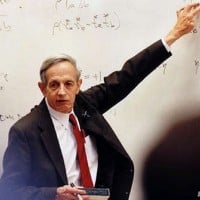Top 10 Nobel Prize Laureates in Economic Sciences
The Top Ten
1 Milton Friedman
2 Gunnar Myrdal and Friedrich August von Hayek
3 Paul Samuelson
4 Gary Becker
5 Wassily Leontief
6 Amartya Sen
7 Daniel Kahneman
8 Robert Merton and Myron Scholes
9 Angus Deaton
10 Leonid Hurwicz, Eric Maskin and Roger Myerson
The Contenders
11 Simon Kuznets
12 Bertil Ohlin and James Meade
13 Lawrence Klein
14 Franco Modigliani
15 Harry Markowitz, Merton Miller and William Sharpe
16 Robert Fogel and Douglass North
17 George Akerlof, A. Michael Spence and Joseph Stiglitz
18 Robert Aumann and Thomas Schelling
19 James Mirrlees and William Vickrey
20 Gerard Debreu
21 John Nash
 John Forbes Nash Jr. was an American mathematician who made fundamental contributions to game theory, differential geometry, and the study of partial differential equations.
John Forbes Nash Jr. was an American mathematician who made fundamental contributions to game theory, differential geometry, and the study of partial differential equations.
 John Forbes Nash Jr. was an American mathematician who made fundamental contributions to game theory, differential geometry, and the study of partial differential equations.
John Forbes Nash Jr. was an American mathematician who made fundamental contributions to game theory, differential geometry, and the study of partial differential equations.BAdd New Item